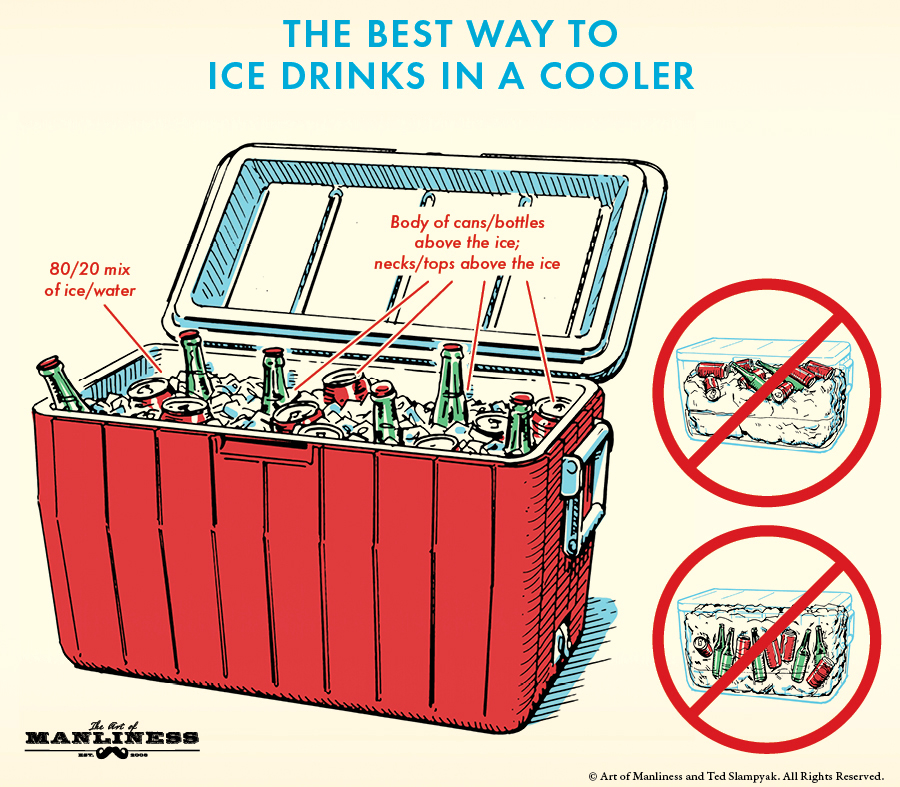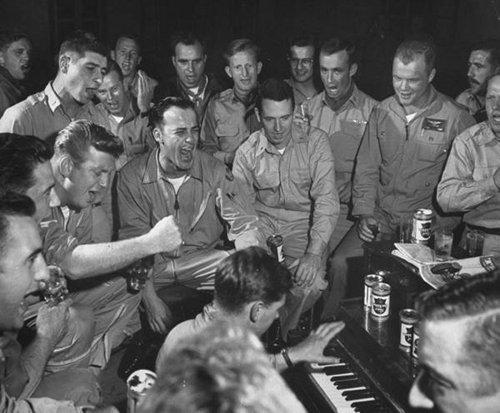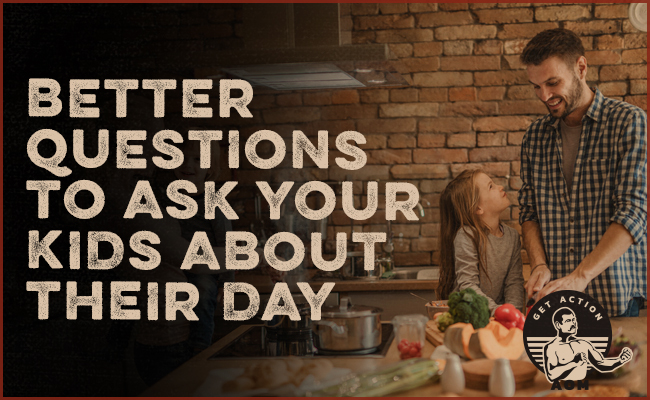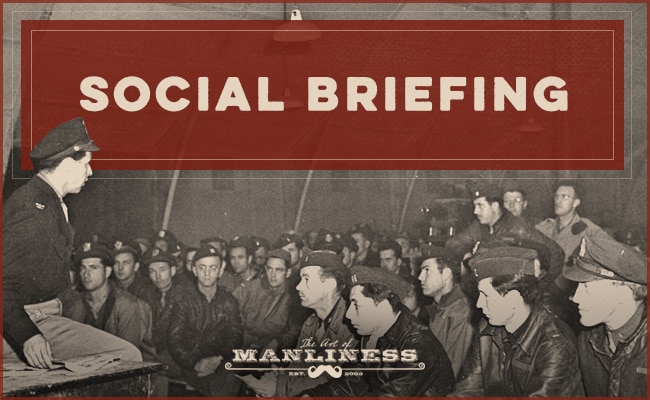
The other evening I took my wife and kids out to eat at a fun, all-ages restaurant located near a shopping mall in the suburbs.
We’ve been to this restaurant lots of times, but I guess they’d recently introduced a new menu because I had never seen this before. A large picture near the front of their menu showcased a tall, frosty glass of beer along with this slogan—
“Celebrate adulthood: get a drink!”
Chalk it up perhaps to the sensitivities of being a father of young children — I felt that same sort of wince a dad feels when he’s at the playground with his kid and hears a teenager shout profanity nearby. Our order was taken, our food arrived, and as we sat munching our burgers and fries I found myself still wrestling with the implications of that slogan.
As adults, particularly as men, we’re encouraged to become close friends with alcohol. It’s a commonly-held belief that alcohol should be a necessary part of our dining out experiences, not to mention any celebratory event.
It’s common to link a 21st birthday with celebrating the legal right to drink. What’s a bachelor party without a hangover the next day? Or a fancy dinner without a bottle of wine? What’s a Super Bowl party without hot wings and beer?
But perhaps it’s wiser to take a closer look at our overall acceptance of alcohol. Maybe we need to be more reluctant toward imbibing. More skeptical. More wary.
Consider three questions every man should ask:
1. Do I know when enough is enough?
On a recent two-hour domestic flight I was seated next to a middle-aged businessman who ordered a double Scotch every time the stewardess passed by.
He was an affable sort, and we talked about the Seahawks and business and our kids. By the time we’d landed, he’d consumed six double Scotches and was slurring his words. He pulled out his smart phone and posted a smiley-faced message on Facebook about how much he’d had to drink on the flight.
Alcohol companies themselves offer this same message: alcohol is safe when used responsibly; but alcohol is not safe when used irresponsibly.
Just think of every episode of COPS you’ve ever seen. Alcohol impairs judgment, inflames passions, and invites conflict. It’s a common link in car accidents, neighborhood disturbances, assault, divorce, theft, rape, and all-around stupidity.
According to modern history, the solution is not prohibition.
Yet a wise man will know the true nature of any product he ingests. As much as he might marvel at alcohol and respect the craftsmanship of making it, he will also be wary of it. A man should be aware of and honest about what “moderation” for him means — about how many drinks he personally can consume before his judgement becomes significantly impaired. He should be able to know his limits and be disciplined enough to honor them. He will know the hollowness of insisting that being hurt by alcohol can’t happen to him.
2. Is anyone pressuring me to drink?
We tend to think of peer pressure as something only teenagers wrestle with. But peer pressure exists anytime the people around us goad us to do something we don’t want to do. It happens in adulthood, too.
Have you ever attended a Christmas party or wedding reception where the host has paid for an open bar and everyone’s drinking heavily? You feel out-of-place, even rude, if you stand around sipping water.
Or have you ever been out with your office buddies after work and a few pitchers of beer are ordered? You’re expected to drink up, or else you’re not a team player.
Maybe we need to question these practices.
I’ve got a good friend who struggled with excessive drinking in his early days who’s now completely on the wagon. Everybody loves him — he’s still fun to be around. These days he usually orders Coke at a restaurant. To be polite, he’ll toast with a full champagne glass at a wedding but not drink any. He’s Catholic and eats the wafer but carefully avoids the wine when taking communion.
A wise man understands the fine line between fitting in with social convention, and doing something simply because everybody else expects you to do it.
If you don’t want to drink, then don’t let anybody pressure you to drink.
3. Do I drink to escape my pain?
I’ve worked with any number of WWII vets who’ve been candid in describing the drinking problems they battled after returning home from conflict.
They describe how alcohol was their generation’s drug of choice, and how the habits that began innocently enough as young men often developed into big problems later on.
The vets who pulled out of it are blunt in their assessment today. A real man doesn’t try to self-medicate away his problems, they say. He tackles his problems head on, gets to the root of the issue, and positively works through his difficulties.
The vets don’t say this to shame any man or put him in his place.
They say this because they’ve been there. They know what works and what doesn’t. They know alcohol won’t heal any wound.
A Season of Temperance
A while back I interviewed Daniel Potter for a book I was writing. He’s the son of the late George L. Potter, one of the original Band of Brothers, the elite group of WWII paratroopers made famous by the HBO miniseries of the same name.
George L. Potter was a war hero and a man of action, yet was also an alcoholic after the war, according to his son, who asked that I not hide the truth about his father when writing about him.
When Daniel was 9, his father took him and his siblings camping at a cabin just north of San Diego. The father became intoxicated and started yelling and hallucinating. He piled the beds against the windows to defend the cabin against the Nazis, whom he was convinced were outside, attacking. Daniel was terrified.
The father died in 1985, partially due to the effects of his alcohol abuse. Daniel spoke of his own experiences with alcohol since then.
In my own life I’ve tried hard to break the cycle of addictions. I never drank much, but when my oldest daughter reached high school, I quit drinking altogether.
It wasn’t like I ever drank much anyway: a six-pack of beer could sit in my fridge untouched for months. But I wanted her to see that alcohol didn’t automatically need to be part of every social gathering. If I went to a party, I didn’t need to drink to have a good time.
That’s what I wanted to show her. I wanted to lead my family from the front. Seven or eight years went by where I didn’t drink at all. Occasionally I’ll have a beer now at dinner, but that’s it.
I like that line — alcohol doesn’t automatically need to be part of every social gathering. A wise man will take that to heart.
Perhaps a season will come when you will want to slow down on drinking, or quit drinking altogether for a time. Maybe just to prove to yourself that you can.
Or maybe it will be for reasons only articulated by you. Health. Mental clarity. Religion. Parenting reasons. A need for intensity at work. A season of silence from intoxicants.
Maybe it’s just a shift in attitude. You’ll nod to the slogan on the new menu, but celebrate your adulthood some other way.
_________________________
Marcus Brotherton is a regular contributor to the Art of Manliness.
Read his blog, Men Who Lead Well, at www.marcusbrotherton.com
Preorder his novel, FEAST FOR THIEVES, in bookstores this September.







